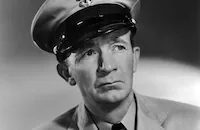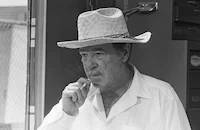Mystery of Edwin Drood
Brief Synopsis
Cast & Crew
Stuart Walker
Claude Rains
Douglass Montgomery
Heather Angel
David Manners
Francis L. Sullivan
Film Details
Technical Specs

Synopsis
John Jasper, a respected choirmaster in the Church of England in Cloisteram in 1864, goes to London twice a week, using the name Orrich, for opium "treatments," during which he dreams of marrying Rosa Bud, his music student. Rosa, however, has been engaged to Jasper's nephew, Edwin Drood, called Ned, since her mother died when she was a little girl. On Rosa's eighteenth birthday, Ned, now twenty-one, asks her to go with him to Egypt as his wife, and she kindly admits she has no more feeling for him than for the girls at Miss Twinkleton's seminary, where she lives. The benevolent schoolmaster, Crisparkle, then holds a dinner party to welcome his new student, Neville Landless, and his sister Helena, who will room with Rosa. The Landlesses are orphans from Ceylon. Neville immediately falls in love with Rosa, but is prone to drinking and has a volatile temper. When Ned mocks Neville for his serious intentions toward Rosa, Neville nearly accosts him with a knife. Rumor that Neville has a violent, foreigner's temper quickly spreads around Cloisteram. Rosa, however, forgives Neville when he tells her about the fight. Rosa's kind guardian, Hiram Grewgious, then gives Ned Rosa's mother's ring, with her instructions that it is to be given to Rosa only if he truly loves her. In order to be true to her mother's memory, Ned breaks the engagement and tells Rosa that Neville loves her. Jasper, still believing the couple is going to marry, goes to the cemetery with the drunken caretaker, Durdles, and mysteriously spends hours in the crypts while Durdles sleeps. On Christmas Eve, during a terrible storm, Jasper has Ned and Neville over for a reconciliation dinner. The next morning, Jasper tells Mayor Thomas Sapsea that Ned is missing and accuses Neville, who was last seen with him, of murder. Crisparkle vouches for Neville before the court and he is released. Neville last saw Ned at the river, and insists on helping the men search it. When Ned's watch is found, Jasper pronounces his nephew dead. Grewgious later informs Jasper that Ned and Rosa broke their engagement and Jasper collapses. Then he posts a two-hundred pound reward for information leading to the murderer of Ned. Jasper begs Rosa for her love in exchange for Neville's life. In terror, Rosa warns Neville and swears her love, finally revealing that her engagement to Ned was broken before his disappearance. Neville disappears himself and, disguised as Thackeray, an old man, takes a room at Mrs. Tope's home next door to Jasper. With Grewgious' help, he discovers Jasper's drug paraphernalia and the wax mold to a tomb key. Meanwhile, Jasper is receiving "treatments" from an opium woman. In his dream state, he shouts to Ned and Rosa and nearly chokes the woman. While looking for Mr. Orrich the night of Ned's murder, the woman, a stranger to Ned, had warned him that "Ned" was a cursed name. When the woman returns to Cloisteram to indict Orrich and collect Jasper's reward, Neville, still in disguise as Thackeray, tells her Jasper and Orrich are the same man and has her wait at Mrs. Tope's. Neville returns with Sapsea, and they find the woman dead. Deputy, a young friend of Durdles who customarily walks him home, accuses Jasper of killing the woman, because Jasper was mean to him the night he went to the crypts. Deputy then leads Neville to Durdles, where Jasper's night at the crypts is revealed. That night, Neville finds Ned's tomb and is about to open it when Jasper arrives. Revealing himself, Neville fights Jasper until Durdles returns with the authorities. When they open the tomb, they find the corpse unidentifiable, but after Grewgious spots Rosa's engagement ring in the coffin, the body is identified as Ned's. Durdles accuses Jasper of murder, and he escapes to the belfry, where, shouting Ned and Rosa's names, he jumps to his death. Neville and Rosa then marry.

Director
Stuart Walker
Cast

Claude Rains

Douglass Montgomery

Heather Angel

David Manners

Francis L. Sullivan

Valerie Hobson
Zeffie Tilbury
Ethel Griffies

E. E. Clive

Walter Kingsford
Forrester Harvey
Veda Buckland
Elsa Buchanan
Georgie Ernest

J. M. Kerrigan
Louise Carter
Edward Cooper

Harry Cording
Evelyn Beresford
May Beatty
Corbet Morris
Eugene Strong
Will "high" Ghere
Anne O'neal
Helena Grant

Walter Brennan
George Kirby
Dora Mayfield

Gordon Douglas
Anne Darling
Rosebud Eberling
Rosita Butler
Alice Ernest
Francis Roberts
Dorothy Shearer
Bunny Beatty

Helen Parrish
Iris Moore
Violet Moore
Carla Laemmle
Anne Harrison
Barbara Perry
Lois Verner
Lloyd Whitlock
Effie Ellsler
Crew
Leopold Atlas
John L. Balderston
Frank Beetson
Camille Collins
Edward Curtiss
Albert S. D'agostino
Margaret Donovan
John P. Fulton
Myrtle Gibsone
Edmund Grainger
Hilda Grenier
Phil Karlstein
Bradley King
Gilbert Kurland
Carl Laemmle Jr.
Carl Laemmle
Carl Laemmle
Otto Lederer
Harry Mancke
George Robinson
Gladys Unger
Edward Ward

Videos
Movie Clip



Film Details
Technical Specs

Articles
The Mystery of Edwin Drood
The Mystery of Edwin Drood is probably Dickens's least known work and with good reason. The book was left unfinished at the time of his death. It was originally intended to be published in six installments between April 1870 and March 1871. At the time of his death in June 1870, the author had completed only three of the segments, leaving the book half finished. Many writers since the time of Dickens's death up to the present day have attempted to complete the tale, including several efforts to solve the mystery on film, radio, theater, and television. The first screen adaptations were done in England in 1909 and the US in 1914. More recent versions include two television series (1960, and one to be broadcast in 2012) and a 1993 film, all of them produced in England.
The 1935 Hollywood production The Mystery of Edwin Drood has the advantage of a studio (Universal) that made its mark in this decade with eerie movies of the macabre and mysterious, as well as a director (Stuart Walker) who had his fingers in both the horror genre (Werewolf of London, 1935) and Dickens (Great Expectations, 1934).
Despite the title, the real focus of the plot is not Edwin himself, who disappears part of the way into the story, but his uncle, opium-addicted choir master John Jasper, who develops an unhealthy obsession with his nephew's intended, the preciously named Rosa Bud, a young student at the finishing school that employs Jasper. The studio's biggest horror star, Boris Karloff (aka Frankenstein's monster) was originally set to play Jasper, but after the success of The Invisible Man (1933), the studio decided to offer that movie's lead player, Claude Rains, a two-picture contract.
Rains was a 44-year-old stage performer who had made only one previous movie in his native England in 1920. His Hollywood debut in The Invisible Man, James Whale's horror movie based on the H.G. Wells story, was a potent performance (despite being unseen most of the film), and he soon found himself in demand. Universal's two attempts to cash in on his new fame--The Man Who Reclaimed His Head (1934) and The Mystery of Edwin Drood -- did not score well with the public, but Rains's career didn't suffer for very long. He became a much-respected staple of a number of top productions, most of them at Warner Brothers, such as The Adventures of Robin Hood (1938), The Sea Hawk (1940), Casablanca (1942), and Notorious (1946). Nominated four times for Best Supporting Actor Oscars®, Rains died in 1967 at the age of 77.
The ending the screenwriters concocted for the story (the mystery of Drood's death was solved) didn't please some Dickens scholars, who believed the author intended to bring Edwin back at the conclusion, basing this assumption on two titles that he had considered for his tale: "The Flight of Edwin Drood" and "Edwin Drood in Hiding." The review in Variety also took exception to the fact that the screen version did not include the character of Lieutenant Tartar whom, according to the review, Dickens "doubtless intended Rosa should wed."
Most reviews, however, were rather glowing, calling the film "good Dickens and a genuinely fine horror story in the bargain." Rains in particular got the best notices, albeit ones that used words like "terrorist performance," "brilliantly repellant," and "tainted with mania." He also got $10,000 for five weeks work on the picture, matching director Walker's weekly pay. Nevertheless, when The Mystery of Edwin Drood was completed, Rains wisely decided to escape further typecasting as a crazed, creepy fiend, despite having his name in the hopper for two of the choicest mad scientist roles of the time: Dr. Pretorious in The Bride of Frankenstein (1935) and Dr. Gogol in Karl Freund's Mad Love (aka The Hands of Orlac, 1935).
Among the familiar faces in the cast is Valerie Hobson, who appeared a short time later as Dr. Frankenstein's fiancée Elizabeth in The Bride of Frankenstein. Hobson also turned up in the key role of Estella in one of the best Dickens adaptations, David Lean's version of Great Expectations (1946). Also in the Drood cast in uncredited bits are perennial supporting player (and three-time Academy Award winner) Walter Brennan and future "Grandpa Walton" Will Geer, who plays the village lamplighter.
Assistant director Phil Karlson later moved into a directing career of his own, notable for several sharp crime dramas and action pictures, among them 99 River Street (1953), The Phenix City Story (1955), The Brothers Rico (1957), and Walking Tall (1973).
Director: Stuart Walker
Producer: Edmund Grainger
Screenplay: Leopold Atlas, John L. Balderston, Bradley King, Gladys Unger, based on the novel by Charles Dickens
Cinematography: George Robinson
Editing: Edward Curtiss
Art Direction: Albert S. D'Agostino
Original Music: Edward Ward, Clifford Vaughan (uncredited)
Cast: Claude Rains (John Jasper), Douglass Montgomery (Neville Landless), Heather Angel (Rosa Bud), David Manners (Edwin Drood), Valerie Hobson (Helena Landless).
BW-87m.
by Rob Nixon

The Mystery of Edwin Drood
Quotes
Trivia
Notes
The title card for this film reads, "Charles Dickens' Mystery of Edwin Drood." The screenwriters provided an ending to Dickens' novel, which he left unfinished upon his death. The Variety review points out that Dickens scholars, led by Stephen Leacock, took exception with the ending of the film because Dickens at one time considered titling his novel The Flight of Edwin Drood or Edwin Drood in Hiding, which suggests that he intended Edwin Drood to return at the end of the story. Variety also points out that the film ignores the character of Lieutenant Tartar, whom, Variety states, Dickens "doubtless intended [Rosa] should wed." Onscreen credits erroneously spell actress Veda Buckland's name "Vera." Many reviews state that the film fits the genre of horror more than mystery.

Miscellaneous Notes
Released in United States 1935
Released in United States on Video August 6, 1996
Released in United States 1935
Released in United States on Video August 6, 1996













